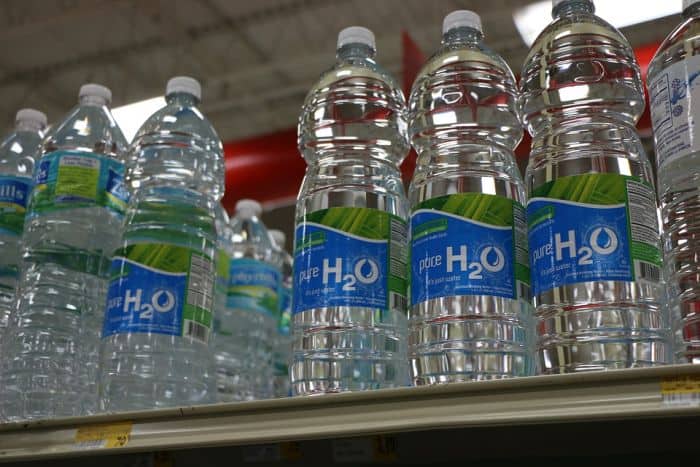Humans can survive for only three days without water, so you’ll certainly want to have water supplies stockpiled in your emergency stores.
However, just because you have a lot of water stored in your home doesn’t mean it’s safe to drink. In fact, bottled water has a surprisingly short shelf life, which is important to keep in mind when prepping your emergency supplies.
Just how long does bottled water last? Well, each brand is slightly different, but most bottled water has a declared shelf life of 1-2 years. Once bottled water is past its expiration date, it might not be safe to drink. However, bottled water can last longer if stored properly.
If you’re wondering how bottled water can possibly expire, you’re not alone. Unfortunately, there is a whole lot of misinformation out there about its shelf-life. Therefore, we’ll walk you through the basics of why bottled water expires so you can be better prepared to store water appropriately for when SHTF.
Bottled Water: To Use Or Not To Use?
The invention of bottled water changed the world, both for better and for worse. Thanks to bottled water, people around the globe are able to have access to clean drinking water, even when other local sources are contaminated with deadly pathogens. However, pollution from bottled water has also created a whole host of problems for our environment.
But, despite any issues that bottled water may cause, it can also be incredibly useful as a resource in a true emergency. Since bottled water is relatively affordable and easy to store, it can be a great addition to your emergency stockpile of supplies.
That being said, it’s not a good idea to simply stockpile water bottles for years, and then forget about them. Water bottles do have an expiration date and ignoring this date can potentially be bad for your health.
Why Does Bottled Water Have An Expiration Date?
If it seems a bit odd to you that bottled water has an expiration date, you’ll be happy to know that this is a fairly common point of confusion. So, we’re here to clarify a few things so you can be better prepared in an emergency.
The fact of the matter is that water itself does not have an expiration date. While water can have a stale or an off-taste, this does not mean it “expired.” Rather, it simply means that there are pathogens and chemicals in your water that are affecting its taste.
Dealing with this is fairly simple, as all you need to do is purify your water by using a filter, or a chemical treatment system.
What does expire, however, is the container that water is stored in. Since most disposable water bottles are made out of plastic, the chemicals in the plastic can start to leach into your water, and contaminate your supply.
Studies have shown that even BPA-free plastic bottles do leach some chemicals over time, though we’re still not yet sure what this can do to our long term health.
Can I Drink Expired Bottled Water?
Since we often eat food that’s past its expiration date, you’re probably wondering whether or not you can drink expired bottled water. The answer? Well, maybe.
Since the water itself doesn’t actually expire, the concern with bottled water is the disintegration of the plastic packaging. However, it’s important to keep in mind that bottled water expiration dates are NOT regulated by the FDA or any other third-party organization.
In fact, many bottled water producers use expiration dates simply as a convenient way to help rotate their stock, not to tell them when it’s time to throw out a water bottle.
In reality, how you store your bottled water is much more important than the expiration date, according to the National Sanitation Foundation (NSF).
According to the NSF, if you keep your unopened bottled water in a cool, dark room or pantry that’s free from chemicals or excessive heat, the water can technically be stored indefinitely.
However, if your water bottles get exposed to any potentially harmful chemicals, direct sunlight, or very hot conditions, they probably aren’t good to use. Basically, if you open your water bottle and it tastes funky, it’s probably best to just throw it out.
What Bottled Water Has The Longest Shelf Life?
Although water itself doesn’t have a shelf life and it is sometimes okay to drink bottled water that’s past its expiration date, you may be curious as to what brand of bottled water has the longest shelf life.
Pretty much any bottled water that you’d find in a supermarket in the United States will have an expiration date within the next two years, so if you want something with a longer declared shelf life, you have only a handful of good options.
These days, there are two main reputable choices when it comes to long-term shelf-stable water: Puravai and Blue Can. Here are the advantages and disadvantages of the two brands.
Puravai Emergency Drinking Water
Puravai Emergency Drinking water is made to last for up to 20 years, thanks to its high-quality packaging. In its water bottles, Puravai uses HDPE #2, which is the type of plastic that the US military uses to make its canteens. HDPE #2 is also the kind of plastic that’s used to make milk jugs and other containers that need to be food-safe for the storage of food and drinks for human consumption.
Puravai’s drinking water has a shelf life of up to 20 years and is preferred by a lot of preppers because it can’t rust or rot. The bottles in Puravai’s drinking water are triple-sealed with 3 layers of protection for long-term storage.
Puravai’s water comes in 1-liter bottles, and it is fairly economical for the world of emergency drinking water, so it’s a solid all-around choice.
Blue Can Emergency Drinking Water
In addition to Puravai, Blue Can is one of the most popular emergency drinking water producers in the world. However, unlike Puravai, Blue Can’s water is packaged in aluminum cans with an FDA-approved non-BPA epoxy coating on the inside.
This packaging system provides Blue Can’s water with an impressive 50-year shelf life. Plus, since Blue Can’s water is packaged in metal cans, not plastic, it can be stored between 33 and 150 degrees Fahrenheit (0 to 65 Celsius) )without any risk of leaching plastics.
The main drawback to Blue Can’s drinking water is that it is slightly more expensive than Puravai’s, but the longer shelf life of Blue Can water means that it might be more economical for you in the long term.
The Verdict
At the end of the day, bottled drinking water does technically have an expiration date of 1-2 years. While there is evidence that bottled water can leach potentially harmful chemicals into our water supply, if you store your water properly, it can last for many years past its stated expiration date.
The key is to only store your water in a cool, dry place that’s away from chemicals, and not in direct sunlight.
If you’re concerned that your bottled water supply has been contaminated, it’s best to play it safe and discard the bottles.
Alternatively, if you don’t want to worry about frequently rotating your supply of drinking water, there are other options for packaged water that have a 20-50 year shelf life that can be a good investment for your emergency stores.
Since water is essential to life, it’s important that you have some in your emergency supplies and that you understand how to store it properly for disasters and emergencies.

Gabrielle is a wilderness survival expert, mountaineering guide, and professional outdoor educator, with specialties that include firearms handling and wilderness medicine. She is also a freelance writer for a variety of outdoor and survival publications.


can ya take out of bottle n store in drums
I have done some experimenting, here’s what I found. The ‘milk bottle’ polypropylene gallons of water you buy at the store have a nasty taste after a year and are undrinkable after two. The HDPE water bottles are okay at one year and getting nasty at two, undrinkable after four years.
If you use 5, 15 or 55 gallon drums, fill them with tap water and replace that water every six months, it’ll be fine.
My testing was done in a garage in Phoenix, so no light, but lots of heat. You should not have water going bad faster than I did.
My take is invest in life straws or other purification methods. My wife prefers distilled water (hates city water taste) and I can tell you no way to store enough. A Lifestraw can purify 4000 Liters of water for 18 bucks! That is a family of four for damn near 6 months! They don’t go bad and they weigh nothing.
I have stored 1 gallon water bottles in standard milk crates and stacked them up in a garage that has no windows.
I’m faily good (not perfect) at rotating them, andI keep the stacks of milk crates covered with a tarp.
I also have a Katadyn pocket filter (13,000 gallons), with a spare parts kit and a spare ceramic filter. I also have other backpacking filters, and plastic sheeting to make solar stills if I absolutely have to.
If I come across a gallon that is drastically outdated, I’ll run the water through the ceramic and activated charcoal filter, and then the water will be fine.
I still want to put a decorative (but functional) hand pump well in the back yard, but I haven’t gotten to it yet.